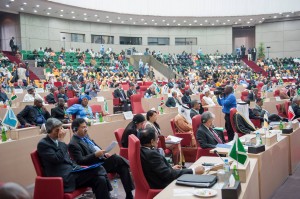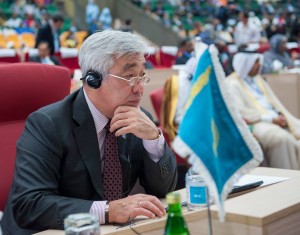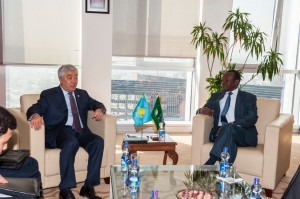 ADDIS ABABA – Minister of Foreign Affairs of Kazakhstan Erlan Idrissov took part in the 40th session of the 57-member Organisation of Islamic Cooperation Council of Foreign Ministers (OIC CFM) during a two-day visit to Conakry, Guinea on Dec. 9-10. The council focused on international efforts to resolve the Israeli-Palestinian conflict, the situation in Syria, Iran’s nuclear programme, assistance to Afghanistan, normalisation of the situation in Mali and other topical issues.
ADDIS ABABA – Minister of Foreign Affairs of Kazakhstan Erlan Idrissov took part in the 40th session of the 57-member Organisation of Islamic Cooperation Council of Foreign Ministers (OIC CFM) during a two-day visit to Conakry, Guinea on Dec. 9-10. The council focused on international efforts to resolve the Israeli-Palestinian conflict, the situation in Syria, Iran’s nuclear programme, assistance to Afghanistan, normalisation of the situation in Mali and other topical issues.
Idrissov met President of Guinea Alpha Conde on the eve of the anniversary session. The brief meeting took place before the departure of the Guinean leader to South Africa to participate in the memorial service for Nelson Mandela. Idrissov was among the three foreign ministers who met the head of the country before his departure.
At the meeting, the parties first discussed issues of mutual trade and investment, the main topic of interest for the African state.
Trade between Kazakhstan and Guinea in 2010 was extremely low, which the Kazakhstan foreign ministry attributes to the lack of contact between the business communities of the two countries, as well as a lack of direct transport routes. Guinea, however, has rich reserves of diamonds, gold and other valuable minerals. Diplomatic relations between Kazakhstan and Guinea were established on April 4, 1992; however, economic and trade relations have not been developed.
In the meeting, Conde also noted the relevance of Kazakhstan’s proposal to institutionalise the process of ensuring food security and praised the contribution of Kazakhstan and President Nursultan Nazarbayev to the global process of non-proliferation of weapons of mass destruction.
While addressing the OIC audience, Idrissov said Kazakhstan attaches great importance to relations with Islamic states and noted that Kazakhstan’s chairmanship in the organisation in 2011-2012 fostered dialogue between Western countries and the Muslim world and contributed to the fight against Islamophobia and anti-Islamic stereotypes.
He also thanked the OIC states for their support of Kazakhstan in its bid to host EXPO 2017, expressing hope that Kazakhstan’s bid for a non-permanent seat in the UN Security Council for 2017-2018 will enjoy similar support.
“First, we have to sadly admit that the OIC is unable to stop the bloodshed in Syria, as Syria’s membership in the organisation, unfortunately, has been suspended,” Idrissov told his colleagues. “Second, the situation in Afghanistan should remain one of the most important items on the OIC agenda. Third, the priority for the Ummah [the Islamic community] and the world remains the issue of Iran’s nuclear programme. Kazakhstan has always recognised the right of any country, including our Iranian brothers, to develop its own peaceful nuclear industry to meet its economic needs. In this regard, we welcome the agreement reached in Geneva on Iran’s nuclear programme between Iran and the six international negotiators.”
During the event, a ceremony of signing the OIC Charter on Food Security took place. Vice-Minister of Agriculture Muslim Umiryayev was Kazakhstan’s authorised signatory to the organisation’s document, which will establish its headquarters in Astana. The foreign ministers expressed unanimous support for the initiative of President Nazarbayev to create a new organisation, having received its charter in the past session.
During his stay in Conakry, Idrissov also met Foreign Minister of Guinea Lucien Fall and held numerous bilateral meetings with heads of delegations of the OIC states.
After the OIC council, the Kazakh foreign minister went to Ethiopia on Dec. 11-12 to meet with that country’s government and the leadership of the African Union, whose headquarters is in Addis Ababa.
Idrissov met Ethiopian President Mulatu Teshome, Prime Minister Hailemariam Desalegn and Foreign Minister Tedros Adhanom Ghebreyesus, becoming the first Kazakh foreign minister to pay a visit to that country. Officials explored potential for economic cooperation in areas from metallurgy to chemical industry to agriculture.
 According to Kazakhstan’s foreign ministry, President Teshome used to be a non-resident ambassador of Ethiopia to Kazakhstan and expressed “special emotional affinity” to Astana. Idrissov discussed with his interlocutors Astana’s plans to build up the presence in Ethiopia, including by opening an embassy in Addis Ababa next year, and to use this presence as a gateway to Africa. Until recently, Kazakhstan only had one resident embassy on the continent, in Egypt, and only last month announced the opening of its embassy in South Africa.
According to Kazakhstan’s foreign ministry, President Teshome used to be a non-resident ambassador of Ethiopia to Kazakhstan and expressed “special emotional affinity” to Astana. Idrissov discussed with his interlocutors Astana’s plans to build up the presence in Ethiopia, including by opening an embassy in Addis Ababa next year, and to use this presence as a gateway to Africa. Until recently, Kazakhstan only had one resident embassy on the continent, in Egypt, and only last month announced the opening of its embassy in South Africa.
Earlier, Idrissov visited the headquarters of the African Union where he met deputy Chair of the Commission of the African Union Erastus Mwencha. In November, Kazakhstan became an observer in this organization, a sign of Astana’s continued quest to expand its economic and political outreach to areas previously outside of its traditional sphere of interests. Idrissov told Mwencha he believed cooperation with the African Union will help promote the relations not only between countries in Africa and Kazakhstan, but also with Central Asia as a whole.
In his address to permanent representatives from the 54-member African Union, Idrisssov specifically highlighted the prospects of Kazakhstan’s cooperation with African nations in areas such as agriculture, mining, chemical industry, oil and gas, education and others.
Calling Africa “a continent of opportunities”, Idrissov said his visit was meant to open doors for Kazakhstan’s businesses to African markets.
